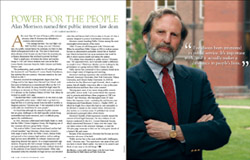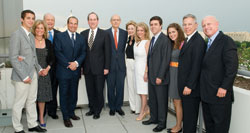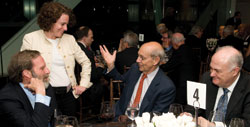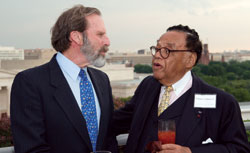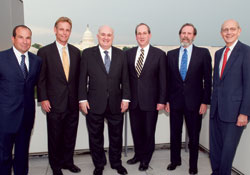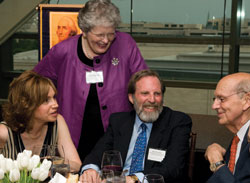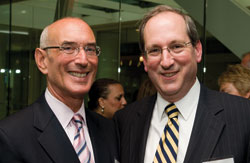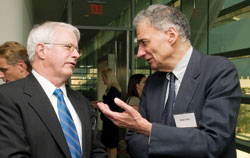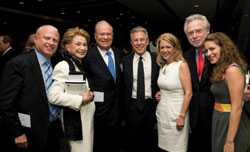Power for the People
Alan Morrison named first public interest law dean
After more than 40 years of being a public interest attorney, Alan B. Morrison has debunked a common misconception.
“The message has been ‘You can’t fight City Hall,’ but that’s wrong—you can,” Morrison says. As a public interest lawyer, he continues, you have to plan which techniques and tools to use. “You have to know more about all areas of law because you don’t have the securities, tax, or finance departments that are found in private law firms.”
That’s a small piece of wisdom the lawyer and teacher brings to GW Law School students next year as the first Lerner Family Associate Dean for Public Interest and Public Service Law.
The professorship was made possible by a $3 million gift from the Annette M. and Theodore N. Lerner Family Foundation, which has endowed this new position. Morrison started at the Law School on July 1.
Morrison received his undergraduate degree from Yale College and his law degree from Harvard Law School, with four years in between as a commissioned officer in the U.S. Navy. After law school, he jump started his legal career by working as an attorney at Cleary Gottlieb and as an assistant U.S. attorney in the Southern District of New York, where he worked on mostly civil cases.
“I decided that what I really wanted to do was work in cases involving public policy issues. I didn’t want to go back to a large law firm or to moving money from one side to another in litigation practice,” Morrison says. “I was interested in how law could make the world better for most people.”
He found that although the rewards of public interest law are great, challenges to the field typically include being understaffed and under-resourced, and it is difficult going against the establishment.
In 1972, Morrison collaborated with Ralph Nader to establish the Public Citizen Litigation Group, the litigating arm of the consumer advocacy group Public Citizen.
“My work at Public Citizen was broad-based, and we had a broad mandate,” says Morrison, whose team covered a wide range of areas of law. At Public Citizen, lawyers broke new ground in less common legal matters, such as making legal services more affordable for ordinary Americans and supporting Internet free speech. As a nongovernmental organization, the group also had a unique vantage point to work on issues dealing with separation of power, without being tied to the positions of one branch of government. Other cases eliminated unfair fee schedules for legal services and attacked rules that said lawyers had to live in state to be part of a bar, a measure designed to protect local lawyers, Morrison says.
Morrison counts founding Public Citizen among the most meaningful achievements of his career.
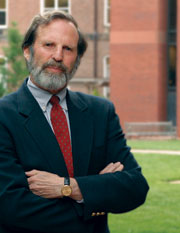
Alan Morrison, a career public interest lawyer, is the first Lerner Family Associate Dean for Public Interest and Public Service Law.
Claire Duggan
“After 37 years, it’s still doing great work,” Morrison says. When he retired from Public Citizen in 2004 to work as a senior lecturer on administrative and public interest law at Stanford Law School, he knew he’d set up an institution that would be able to attract superior people and sustain the mission.
“I’ve always been interested in public service,” Morrison says. “It’s important work, and it actually makes a difference in people’s lives.” That’s true whether you’re working for the government or a group such as Public Citizen, he says.
Public service has continued to be a common thread as he wove a legal career of litigating and teaching.
Morrison’s teaching experience also included stints at Harvard, American University, New York University, Tulane University, and China’s Fudan University. In 2008 he worked at the Fair Elections Legal Network, which sought to ensure that all eligible voters were able to vote in the presidential election and have their votes counted.
“Having spent most of my career doing public interest and public service work, I am excited about this opportunity to promote and advance these programs at GW Law School,” says Morrison, who has argued some 20 cases before the Supreme Court—including the well-known case Immigration and Naturalization Service v. Chadha (1983), in which he fought for a client who had no real nationality to be allowed to remain in the United States. Morrison has also written or co-written some 30 published law review articles and is principal editor of two books.
Morrison’s breadth of law experience recently earned the interest of local legal historians. He was a subject of oral history conducted by the D.C. Circuit Historical Society, which interviewed Morrison 11 times over two years. One can listen online to the extensive dialogue, or read the 300-plus-page transcript to find out the nitty-gritty details of a lawyer’s life and career.
Because of his experiences, Morrison has become an even stauncher advocate of his field.
“Public service law is the most intellectually challenging work,” Morrison says. “You must know vast areas of law, and you have to know what’s useful. You have to be creative and think of new ways to do old things.”
Toasting a New Partnership
The celebration to honor Alan B. Morrison’s appointment as the inaugural Lerner Family Associate Dean for Public Interest/Public Service brought together prominent figures from the legal and political communities, members of The George Washington University Board of Trustees, and Law School faculty members and alumni. Held at the Newseum on June 2, guests enjoyed its unique view of the Capitol and the opportunity to meet notable people such as U.S. Supreme Court Justice Stephen Breyer, CNN journalist Wolf Blitzer, former President of Public Citizen Joan Claybrook, former Secretary of Transportation William Coleman, and Public Citizen Co-founder Ralph Nader. Dean Frederick M. Lawrence emceed the event, which featured remarks by GW President Steven Knapp, University Trustee Robert K. Tanenbaum, and Lerner Associate Dean for Public Interest/Public Service Alan B. Morrison. Lawrence and Dr. Knapp emphasized the University’s gratitude to the extended Lerner family for endowing the associate dean position through a generous $3 million gift.
Dr. Knapp noted “the critical importance of a commitment to public service as a defining characteristic of our students and faculty, [and] its importance to what George Washington had in mind when he conceived this great national university more than 200 years ago.” Dr. Knapp views the Lerner Family Associate Deanship as opening “an important new chapter in the University’s long history of leadership in the fields of public interest and public service... [and serving as] an inspiring model for [GW] as a whole.”
University Trustee Robert K. Tanenbaum outlined the Lerner family’s longstanding connection with GW Law, beginning with Ted Lerner’s experience as a GW Law student on the GI Bill and carrying through to his own experience as a law student, including meeting his wife, Marla Lerner Tanenbaum, in the law library. He expressed the family’s excitement about the new associate deanship, saying, “Public service has taken on a whole new meaning for us.”
A Public Service Law School
Dedication to public service distinguishes GW Law graduates. Of the more than 23,000 living GW Law alumni, 150 are judges serving on local, state, and federal benches, including 10 justices on State Supreme Courts. The Law School counts among its prominent alumni the late John Foster Dulles, LLB 1912, and the late J. William Fulbright, LLB ’34, HON. Doctor of Laws ’59; former Attorney General William P. Barr, JD ’77; former Treasury Secretary John W. Snow, JD ’67; U.S. Sens. Daniel K. Inouye, JD ’52, and Harry Reid, JD ’64; former Armed Services Board of Contract Appeals Judge Ruth C. Burg, JD ’50; U.S. Court of Appeals for the Federal Circuit Judge Randall R. Rader, JD ’78; Montgomery County Executive Isiah “Ike” Leggett, LLM ’76; and Founder and Executive Director of Share Our Strength, William “Bill” Shore, JD ’81. President Barack Obama appointed several GW Law alumnae to significant positions in his administration: Mary L. Schapiro, JD ’80, the first woman to serve as chairman of the Securities and Exchange Commission (see story Answering the Nation's Call); Wilma B. Liebman, JD ’74, chairman of the National Labor Relations Board (see story Answering the Nation's Call); and Mary DeRosa, JD ’84, deputy counsel for National Security Affairs and legal adviser to the National Security Council.
Friends and former colleagues of Morrison lauded his selection as the new public interest dean. “He’s a superior lawyer and you’re lucky to have him,” said William T. Coleman Jr., senior partner at O’Melveny & Myers and former secretary of transportation.
“He has the highest ethical standards you could imagine,” said Ralph Nader, with whom Morrison founded the consumer advocacy group, Public Citizen, in 1972. “He never wavers; it borders on ruthless.”
As Lawrence recounted Morrison’s accomplishments and what he would bring to the Law School, he borrowed a line from baseball, saying, “‘It ain’t bragging if you can back it up.’ Well, we can back it up!”
Accepting his appointment, Morrison outlined his goals as associate dean of public interest. Making the practice of public interest law more financially viable was at the top of the list, saying he will lobby for programs which focus on repayment of law students’ debts and on making scholarship funds available.
“I want to make the students appreciate the value to themselves and to the community,” Morrison said. “I want to take the pull away from the law firms and take the financial barriers away.”
Morrison also said he hopes to improve the pro bono program and “instill in students the value of pro bono work.”
Summing up his overall goals for the Law School, Morrison said, “My goal is for two prospective law students, having a conversation about schools, to say, ‘GW? Oh, that’s the public interest law school.’”
—Alexa Zenzano
Dave Scavone
Dave Scavone
Dave Scavone
Dave Scavone |
Dave Scavone
Dave Scavone
Dave Scavone
Dave Scavone |

